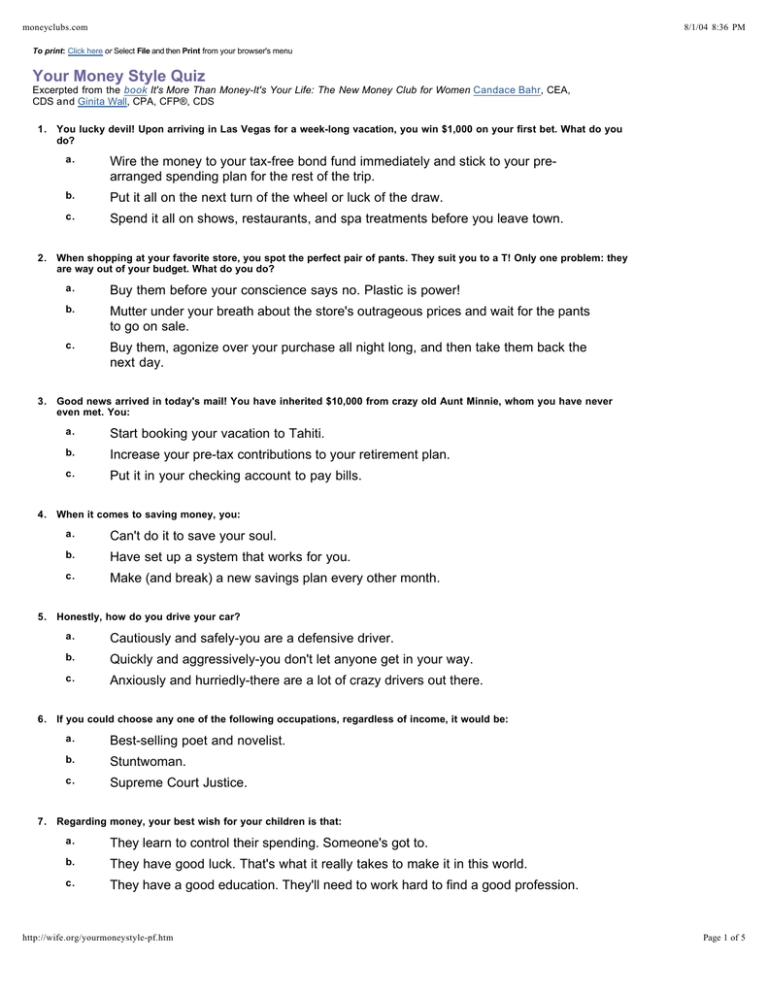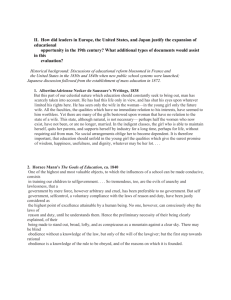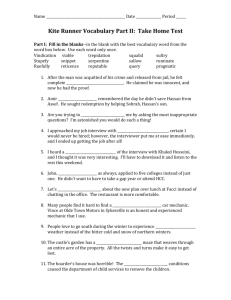
moneyclubs.com
8/1/04 8:36 PM
To print: Click here or Select File and then Print from your browser's menu
Your Money Style Quiz
Excerpted from the book It's More Than Money-It's Your Life: The New Money Club for Women Candace Bahr, CEA,
CDS and Ginita Wall, CPA, CFP®, CDS
1. You lucky devil! Upon arriving in Las Vegas for a week-long vacation, you win $1,000 on your first bet. What do you
do?
a.
Wire the money to your tax-free bond fund immediately and stick to your prearranged spending plan for the rest of the trip.
b.
Put it all on the next turn of the wheel or luck of the draw.
c.
Spend it all on shows, restaurants, and spa treatments before you leave town.
2. When shopping at your favorite store, you spot the perfect pair of pants. They suit you to a T! Only one problem: they
are way out of your budget. What do you do?
a.
Buy them before your conscience says no. Plastic is power!
b.
Mutter under your breath about the store's outrageous prices and wait for the pants
to go on sale.
c.
Buy them, agonize over your purchase all night long, and then take them back the
next day.
3. Good news arrived in today's mail! You have inherited $10,000 from crazy old Aunt Minnie, whom you have never
even met. You:
a.
Start booking your vacation to Tahiti.
b.
Increase your pre-tax contributions to your retirement plan.
c.
Put it in your checking account to pay bills.
4. When it comes to saving money, you:
a.
Can't do it to save your soul.
b.
Have set up a system that works for you.
c.
Make (and break) a new savings plan every other month.
5. Honestly, how do you drive your car?
a.
Cautiously and safely-you are a defensive driver.
b.
Quickly and aggressively-you don't let anyone get in your way.
c.
Anxiously and hurriedly-there are a lot of crazy drivers out there.
6. If you could choose any one of the following occupations, regardless of income, it would be:
a.
Best-selling poet and novelist.
b.
Stuntwoman.
c.
Supreme Court Justice.
7. Regarding money, your best wish for your children is that:
a.
They learn to control their spending. Someone's got to.
b.
They have good luck. That's what it really takes to make it in this world.
c.
They have a good education. They'll need to work hard to find a good profession.
http://wife.org/yourmoneystyle-pf.htm
Page 1 of 5
moneyclubs.com
8/1/04 8:36 PM
8. Money-wise, what do you look for in a mate?
a.
A stable income and a conservative investment style.
b.
A hot car in his driveway and a lot of shiny plastic in his wallet.
c.
A lack of concern for material things.
9. When you think of your retirement, you:
10.
11.
12.
13.
14.
15.
a.
Cross your fingers, close your eyes, and begin to pray.
b.
Hope your investment plans work out.
c.
Can't wait for the party to begin-I hear the weather is lovely in Florida this time of
year!
Your worst money problem is your:
a.
Lack of financial education.
b.
Shopaholic tendencies.
c.
Procrastination.
Your worst fear about money is:
a.
Being awakened by the sound of creditors underneath your bedroom window, baying
for blood.
b.
A tremendous stock and real estate market crash reducing your net worth by 90
percent.
c.
Realizing that you are 55 and have no assets other than your car.
If asked how much is in your bank account right now, you'd say:
a.
"Do you want me to include the outstanding checks not yet posted to the account?"
b.
"I'm not sure of the exact balance."
c.
"I hope I didn't bounce any checks this week."
When you get a retirement account statement, you:
a.
Check it over very carefully.
b.
Give up trying to figure it out after a few minutes.
c.
Toss it in a drawer and assume the company must be right.
A quality that you admire in yourself is:
a.
Punctuality-you're always on time.
b.
Spirituality-you're not a money-grubber
c.
Vivacity-you're the life of the party.
The reason you don't have as much money as you want is:
a.
You're too cautious. You miss out on great investments because you don't want to
take a risk.
b.
You throw it away. You keep buying things you don't really need.
c.
You're not really sure why you don't have as much money as you want.
http://wife.org/yourmoneystyle-pf.htm
Page 2 of 5
moneyclubs.com
16.
17.
Guests are arriving for Thanksgiving dinner in one hour. In the kitchen, you're:
a.
Frantic, messy, and creative-you're trying to perfect a new recipe you created just
for this occasion.
b.
Disorganized, frustrated, and slow-you know that the turkey is around here
somewhere!
c.
Organized, fast, and clean-everything's in the oven already and you just setting up a
few last minute details.
When entertaining, you like:
a.
Spontaneous bashes with a few hundred of your closest friends.
b.
Well-planned parties for your monthly dinner group.
c.
18.
19.
20.
8/1/04 8:36 PM
!Informal get-togethers with friends in the great outdoors.
Your attitude toward life is best summed up with the phrase:
a.
A stitch in time saves nine.
b.
He who laughs last laughs best.
c.
Ignorance is bliss.
When tipping in a restaurant, you:
a.
Tip in accordance with the quality of the service. You reward good servers and
punish bad ones.
b.
Tip lavishly. You expect to get the best service in the house next time.
c.
Tip well even if the service is mediocre. You don't want to embarrass the server.
What you don't know about money:
a.
Can't hurt you.
b.
Can be learned.
c.
Will catch up with you one way or another.
Scoring:
In the chart below, circle the letter (H, A, or S) to which each of your answers corresponds. Then count the number of circles for
each type and fill in the blanks next to each type. The type with the highest number is your money style.
A
B
C
1.
H
S
A
2.
!S
H
A
3.
S
H
A
4.
S
H
A
5.
H
S
A
6.
A
S
H
7.
S
A
H
8.
H
S
A
9.
A
H
S
10.
A
S
H
http://wife.org/yourmoneystyle-pf.htm
Page 3 of 5
moneyclubs.com
8/1/04 8:36 PM
11.
S
H
A
12.
H
S
A
13.
H
A
S
14.
H
A
S
15.
H
S
A
16.
S
A
H
17.
S
H
A
18.
H
S
A
19.
H
S
A
20.
S
H
A
______ Hoarder
______ Avoider
______ S plurger
Rating:
From the scores above, you can see which of the money styles dominates your personality.
The Hoarder
The Hoarder is deeply attached to her money. Her hobby is saving money, and she loves to see her bank account grow. She is
also apt to clip coupons, set budgets, and prioritize financial goals, although she may not be inclined to take on much risk. The
Hoarder keeps her money "safe in the bank," never considering that inflation is eating away at her savings every day. She is less
concerned with having money now than with her security in the future, and although she appears successful, she often worries
that she may outlive her money and end up in poverty.
The Hoarder also has a hard time spending money on herself and her loved ones, especially on luxury items or things that offer
only short-term gratification. Many Hoarders worry about money and feel that they will never have enough to feel secure. Others
channel their thrifty tendencies into bargain hunting, always looking for the big sale. Getting a bargain makes her feel great, but
finding out there was a better deal elsewhere makes her feel awful. Whatever outlet she uses to channel her anxieties, the
Hoarder attempts to assert financial control of her life by focusing on details, and she is usually apprehensive about making
mistakes.
If you are a Hoarder: With obvious exceptions, the Hoarder is onto a good thing. Financial security is essential for creating and
building self-esteem. But too much hoarding can be destructive and can lead to inner turmoil and bitter conflicts with family and
friends.
If you are a tried-and-true Hoarder, you can take three positive steps toward a secure future:
1.
Systematically examine your financial situation and assess your goals; then decide how much money you will need to reach
your goals.
2.
Take more risks with your money to gain greater rewards; make your money work as hard as you do. For example, channel
the energy you might use looking for bargains into researching appropriate investment options for your financial goals and
risk tolerance.
3.
Once you know what you need to reach your goals and you have your money working for you, enjoy life! After saving and
investing for your future, spend the remainder without guilt or anxiety.
The Avoider
The Avoider has trouble dealing with her finances, whether balancing her checkbook, budgeting, paying bills or investing. She
may have a fear of money that stems from a lack of self-confidence in dealing with financial transactions. As a result, the Avoider
prefers to ignore the issue of money rather than confront her anxieties and take control of her finances.
Alternately, the Avoider might believe that money is evil and has the power to corrupt. She feels that having too much wealth or
making a profit on investments means she is being greedy or selling out on her values and beliefs. Avoiders are not inclined to
keep tabs on their current spending or invest for the future, and they may alienate their loved ones with their self-righteous
attitude toward wealth.
If you are an Avoider: First, you need to take an honest look at why you're evading the issue of money. Do you feel like you lack
the knowledge to make informed financial decisions? Or do you think that money and material possessions are superfluous, and
want to follow a more spiritually virtuous path of poverty?
If it's a lack of self-confidence that's standing in your way, make an effort to learn about financial planning. You can find both
basic and detailed information in books such as this one, magazines and newspapers, and through the Money Club website. If
you haven't already joined a Money Club, start your own with a few of your friends. In the Money Club, you can figure out which
financial issues need to be addressed immediately, like learning to balance your checkbook, and paying your bills on time, and
http://wife.org/yourmoneystyle-pf.htm
Page 4 of 5
moneyclubs.com
8/1/04 8:36 PM
which you can tackle in the near future, like researching different mutual funds for your retirement plan.
If you think money is the root of all evil, remember that you can do a lot of good with your wealth, and there is no sin in success.
Consider investing in socially responsible companies or creating a charitable fund in your own name. And recognize that having
money affords you the opportunity to help the people and causes that are nearest to your heart. You don't have to live
extravagantly, but you shouldn't jeopardize your future security either.
The Splurger
The Splurger's credit cards are her best friends, but like some friends, they frequently talk her into spending money she can't
really afford. The Splurger hates to limit herself-after all, she works hard for her money, and deserves to have money make her
feel good. At the same time, however, she might feel frustrated that all her hard work hasn't garnered her more spectacular
financial rewards, and she often splurges to cheer herself up or make herself feel more successful. Splurgers have a hard time
budgeting, and difficulty delaying gratification in the present to save for the future.
The Splurger is also prone to fantasies of financial rescue, and fears achieving success on her own, afraid that she will give up a
certain emotional dependency that has been keeping her from being self-supporting. While she waits for the miracle person or
event that will solve her financial woes, the Spender may spend most of what she has at her disposal, or rack up a hefty amount
of debt.
If you are a Splurger: Although money is tightly intertwined with the Splurger's definition of success, Splurgers never feel they
have enough money, or seldom have a clear perception of what money is. For many Splurgers, money is also a measure of love
and approval. The Splurger uses money to make herself feel good, but when splurging undermines her financial security, it's time
to get a grip on it.
If you share some of these characteristics, reward yourself for good performance with occasional splurges rather than all-out
spending binges. Or perhaps you can learn to enjoy making sound financial purchases: Splurge on some smart investments that
will grow in value in the future, rather than buying more clothes you don't need.
Similarly, instead of lavishing money and gifts on others, concentrate on building personal relationships on foundations other
than money. Invest your time and your attention in your relationships with others, and invest your money in yourself. You will
achieve considerably more satisfaction on both fronts.
Our thanks to Olivia Mellan, whose groundbreaking work in this area appeared in her book Money Harmony: Resolving Money
Conflicts in Your Life and Relationships (Walker & Co., 1994).
©2003 WIFE.org. All rights reserved.
return to previous page
http://wife.org/yourmoneystyle-pf.htm
Page 5 of 5






